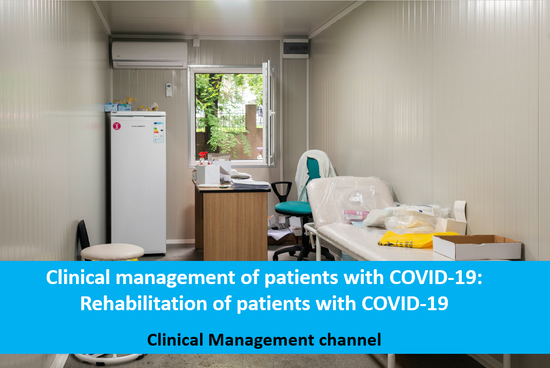
The course of the Clinical Management of Patients with COVID-19 course series is devoted to the rehabilitation of patients with COVID-19. The seven course modules address the manifold and varied rehabilitation needs of patients recovering from COVID-19, including patients with cognitive impairment, physical deconditioning and weakness, respiratory impairment, swallow impairment, communication impairment and challenges in completing Activities of Daily Living (ADLs). Techniques for rehabilitation also are addressed.
These materials were launched on 13/01/2021. As the scientific evidence and technical guidance regarding COVID-19 are constantly evolving, the materials in this course are outdated. This course is undergoing a revision. In the meantime, please refer to https://www.who.int/emergencies/diseases/novel-coronavirus-2019 for the latest updates.
WHO / Blink Media - Martyn Aim
语言: English
COVID-19
课程信息
This course is also available in the following languages:
Macedonian - Français - Shqip - 中文 - Русский - Українська - Հայերեն
Overview: The Clinical Management of Patients with COVID-19 course series is developed for healthcare workers during the COVID-19 pandemic. It provides crucial knowledge necessary to provide safe, effective quality patient care. Presentations address all aspects of clinical management, including facility preparation and surge planning; health worker infection prevention and control; interfacility transfer; clinical management of mild, moderate, and severely ill patients with COVID-19; special considerations for geriatric, pregnant, and pediatric patients with COVID-19; rehabilitation; and ethics and palliative care.
The course series includes video lectures and downloadable presentations that have been updated with the latest guidance and evidence. Each course contains 5-8 modules, and each module includes a quiz to evaluate knowledge acquisition.
Should you be interested in learning more about other aspects of clinical management of patients with COVID-19, please refer to the following courses of the Clinical Management of Patients with COVID-19 course series:
- Clinical management of patients with COVID-19: General considerations
- Clinical management of patients with COVID-19: Initial approach to the acutely ill patient
- Clinical management of patients with COVID-19: Investigations and care for mild, moderate and severe disease
Learning objectives:
By the end of this course, participants should be able to:
- Understand the role of rehabilitation in the management of impairments resulting from COVID-19;
- Describe the etiology of a range of rehabilitation-related impairments in COVID-19;
- Know who and when to assess for rehabilitation needs;
- Provide education and advice to patients and their families; and
- Advise on strategies to help patients and their families manage their impairments.
Course duration: This course will take approximately 3 hours to complete.
Certificates: A Record of Achievement certificate will be available to participants who score at least 80% of the total points available across all of the quizzes. A Confirmation of Participation certificate is also available for participants who complete at least 80% of the course material. Participants who receive a Record of Achievement can also download an Open Badge for this course. Click here to learn how.
课程内容
Module 1: Rehabilitation overview and care pathway:
By the end of this module, participants should be able to: describe potential rehabilitation requirements during a patient’s care pathway; recognize multidisciplinary contributions to acute and post-acute rehabilitation, and outline potential challenges and risks associated with rehabilitation for COVID-19 patients and strategies to address these.Module 2: Rehabilitation for patients with cognitive impairments after COVID-19 illness:
By the end of this module, participants should be able to: describe the etiology of cognitive impairment in COVID-19; know who and when to assess for cognitive impairment; provide education and advice to patients and their families; and advise on strategies to help patients and their families manage cognitive impairment.Module 3: Rehabilitation for patients with physical deconditioning and muscle weakness after COVID-19 illness:
By the end of this module, participants should be able to: describe the etiology of physical deconditioning and muscle weakness in the context of COVID-19; know who and when to assess for physical deconditioning; provide education and advice to patients and their families with physical deconditioning; advise on rehabilitation interventions for patients with physical deconditioning.Module 4: Rehabilitation for patients with lung impairment after COVID-19 illness:
By the end of this module, participants should be able to: describe the etiology of lung impairment in the context of COVID-19; know who and when to assess for lung impairment; provide education and advice to patients and their families with lung impairment, and advise on rehabilitation interventions for patients with lung impairment.Module 5: Rehabilitation for patients with swallowing impairment after COVID-19 illness:
By the end of this module, participants should be able to: describe the etiology of potential swallowing impairments (dysphagia) in the context of COVID-19; know when to assess for swallowing assessment; provide education and advice to patients with swallowing impairment and their families, and provide advice and strategies to help patients and their families manage dysphagia.Module 6: Rehabilitation for patients with communication impairment after COVID-19 illness:
By the end of this module, participants should be able to: describe potential etiologies of communication impairment in the context of COVID-19; know whom to assess for communication impairment and when to assess them; provide education and advice to patients with communication challenges and their families, and advise on strategies to help patients and their families manage communication impairments.Module 7: Rehabilitation for patients with difficulty carrying out activities of daily living (ADLs) after COVID-19 illness:
By the end of this module, participants should be able to: describe the underlying factors potentially contributing to difficulties in carrying out ADLs in the context of COVID-19; know who would benefit from an ADL assessment; provide education and advice to patients and their families regarding ADLs; provide energy conservation strategies and describe potential environmental modifications to improve performance in ADLs.
订阅本课程
证书要求
- 课程证书 授予者需要至少取得课程总分的百分之 80%。
- 参与证明 授予者需要至少学习了所有课程资料的百分之 80%。
- 完成课程可获得开放徽章。